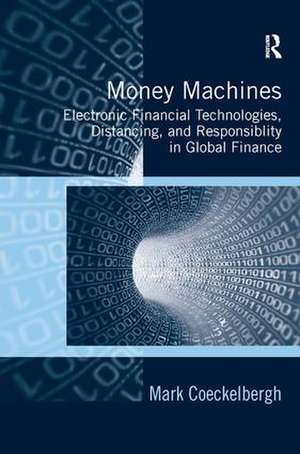Money Machines: Electronic Financial Technologies, Distancing, and Responsibility in Global Finance
Autor Mark Coeckelberghen Limba Engleză Hardback – 28 apr 2015
| Toate formatele și edițiile | Preț | Express |
|---|---|---|
| Paperback (1) | 256.76 lei 6-8 săpt. | |
| Taylor & Francis – 30 iun 2020 | 256.76 lei 6-8 săpt. | |
| Hardback (1) | 763.97 lei 6-8 săpt. | |
| Taylor & Francis – 28 apr 2015 | 763.97 lei 6-8 săpt. |
Preț: 763.97 lei
Preț vechi: 1027.28 lei
-26% Nou
Puncte Express: 1146
Preț estimativ în valută:
146.18€ • 153.04$ • 120.96£
146.18€ • 153.04$ • 120.96£
Carte tipărită la comandă
Livrare economică 05-19 aprilie
Preluare comenzi: 021 569.72.76
Specificații
ISBN-13: 9781472445087
ISBN-10: 1472445082
Pagini: 212
Dimensiuni: 156 x 234 x 19 mm
Greutate: 0.44 kg
Ediția:1
Editura: Taylor & Francis
Colecția Routledge
Locul publicării:Oxford, United Kingdom
ISBN-10: 1472445082
Pagini: 212
Dimensiuni: 156 x 234 x 19 mm
Greutate: 0.44 kg
Ediția:1
Editura: Taylor & Francis
Colecția Routledge
Locul publicării:Oxford, United Kingdom
Notă biografică
Mark Coeckelbergh is Professor of Technology and Social Responsibility at De Montfort University, UK. Previously he was Managing Director of the 3TU Centre for Ethics and Technology and affiliated to the Philosophy Department of the University of Twente, The Netherlands. His publications include Growing Moral Relations (2012), Human Being @ Risk (2013), and numerous publications in the area of ethics and technology, in particular the ethics of robotics and ICTs.
Recenzii
’As if proving Heidegger correct, what the recent financial crisis clearly demonstrates is the extent to which the techniques and technologies of global finance have remained transparent and virtually invisible. In this eye-opening book, Mark Coeckelbergh expertly exhibits and examines the influential but often unseen machines, machinery, and mechanisms of money that now regulate every aspect of contemporary life.’ David J. Gunkel, Northern Illinois University, USA ’Mark Coeckelbergh is recognized internationally for illuminating the manner in which information and communication technologies (ICTs) create new forms of distancing and in particular moral distancing. This important book extends that analysis to underscore the hidden ways ICTs shape money and global finance, alter relationships, and undermine responsibility.’ Wendell Wallach, Yale University, USA
Descriere
Money Machines focuses on the role of technology in global finance and reflects on the ethical and societal meaning and impact of financial information and communication technologies (ICTs). Exploring the history, metaphysics, and geography of money, algorithms, and electronic currencies, the author argues that financial ICTs contribute to impersonal, disengaged, placeless, and objectifying relations, and that in the context of globalization these 'distancing' effects render it increasingly difficult to exercise and ascribe responsibility. The book also examines the ways in which contemporary techno-financial developments can be resisted or re-oriented in a morally and socially responsible direction - not without, but with technology.
